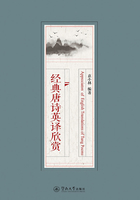
28.蜂
不论平地与山尖,无限风光尽被占。
采得百花成蜜后,为谁辛苦为谁甜?
中文解读
罗隐(公元833—909年),晚唐著名诗人,一生写了许多政治讽刺诗,揭露了唐末社会的黑暗面。这是一首咏物诗,既赞美了那些终日勤劳、不畏艰难、为社会创造财富的人,又讽刺了那些不耕而食、不织而衣、不劳而获的人。
蜂与蝶在诗人词客的笔下成为风韵的象征。然而小蜜蜂毕竟与花蝴蝶不同,它是为酿蜜而劳苦一生,积累甚多而享受甚少。诗人罗隐着眼于这一点,写出这样一则寄慨遥深的“动物故事”。仅其立意就令人耳目一新。前两句几乎是用矜夸的口吻说,无论是平原田野还是崇山峻岭,凡是鲜花盛开的地方,都是蜜蜂的领地。末二句对前二句反跌一笔,说蜂采花成蜜,不知归属于谁,将“尽”“占”二字一扫而空,表达效果强烈。
白话译文
无论是平地还是山尖,凡是鲜花盛开的地方,都被蜜蜂占领。它们采尽百花酿成蜜后,到头来又是在为谁忙碌?为谁酿造甜甜的蜂蜜呢?
英译一
Bees
Translated by Guo Zhuzhang
All sights, regardless of flat grounds and peaks,
Have been visited by the working bees.
After all flowers are touched and honey's made,
They know not for whose sweet they all toil?
(toil v.长时间或辛苦地工作)
英译二
To the Bees
Translated by Xu Yuanchong
On the plain or atop the hill,
Of beauty you enjoy your fill.
You gather honey from flowers sweet,
For whom are you busy and fleet?
(fleet v.疾驰,飞逝)
英译欣赏
The bees are lovely, hardworking creatures who bring sweetness to people. The poem also ridicules those who only want to get without working. The poem can also be considered as a Chinese puzzle.
这首咏蜜蜂的诗,没有出现一个“蜂”字。中文诗文常可以省略主语,但英语表达中必须有主语,所以英译都加了主语。英译一是武汉大学郭著章教授的翻译,英译二是北京大学许渊冲教授的翻译。
英译一用第三人称来指代蜜蜂,英译二用第二人称来指代蜜蜂。
All sights, regardless of flat grounds or peaks, Have been visited by the working bees,用regardless of表示“不论”, all sights 表示“无限风光”。
第三、四句,After all flowers are touched and honey's made, they know not for whose sweet they all toil?这句they know not是比较传统的句式,应是They don't know for whose sweet they all toil?
英译二译得文雅简洁,采用aabb押韵,好像对着蜜蜂来说话,体现着许教授一贯追求的“音美、形美、意美”,全诗总共用了26个单词,很好地传达了原诗的意境和神韵。
On the plain or atop the hill,用一个or表达了“不论”,简洁有力。
Of beauty you enjoy your fill=You enjoy your fill of beauty,你享受着你占有的所有的美。
You gather honey from flowers sweet,
For whom are you busy and fleet?
“为谁辛苦为谁甜?”中“辛苦”一词,英译一用toil(长时间或辛苦的工作)来表示;而英译二用fleet(疾驰,飞奔)来形容,各有所妙。
思考
英文中,“不论”有多少种表达方式?